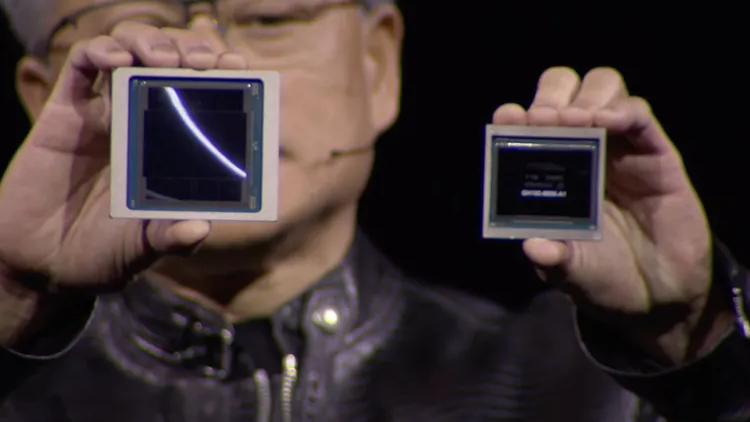
AI is going to be a literal game-changer, eventually – in revolutionizing how games are created and realized – and that could happen sooner than you think, or so Nvidia’s CEO believes.
No, we’re not talking about the near future, of course, but a world where games are fully driven by AI may arrive by the time this decade is out, if Jensen Huang is correct.
Let’s rewind a bit here, and for context, remind ourselves of something Huang previously said in his GTC keynote speech last year – namely that: “Every single pixel will be generated soon. Not rendered: generated.”
In other words, GPUs won’t simply be rendering an environment, but generating or creating it.
With that in mind, at this year’s GTC, Bilawal Sidhu (a TED speaker who used to work on Google Maps, and AR/VR), asked the CEO a follow-up question on that previous statement: “How far are we from a world where every pixel is generated at real-time frame rates?”
I asked Jensen about his iconic AI prediction:‘How far are we from a world where every pixel is generated at real-time frame rates?’Jensen thinks we’re ‘5-8 years away’ and is already seeing signs of traversing the S-curve of innovation.The entire gaming and simulation… pic.twitter.com/mfAUb9rkMhMarch 19, 2024
As Tom’s Hardware picked up, Huang replied in a rather rambling fashion (deep breath): “I think with almost everything in technology, the S curve is not longer than a decade once it becomes true, once it becomes practical and better … In ten year’s time you’re at the other end of that S curve.
“In five years from now, you’re probably right in the middle where everything is changing in real-time, and everybody’s going, ‘Oh, look at that, this is happening.’ And so you just got to decide, are we two years into it, into that ten years? Probably, we’re probably already two years into it. And so I would say that within the next five to ten years, somewhere in between, it’s largely the case.”
As Sidhu distils in the above tweet, the gist of the prediction is that we’re probably eight years away, so we’re looking at 2030 or slightly thereafter for games being generated in real-time (or indeed movies and other content, for that matter).
What does that really mean though? Let’s explore that next.

Analysis: The generation game
This is a tricky one to pin down. As Sidhu, who asked the pertinent question, suggests, we likely haven’t fully grasped what is yet to come – but it will change the entire gaming industry. Although it won’t be the only industry that AI will turn swiftly on its head, no doubt.
We are already seeing AI-generated movies (well, short clips) courtesy of Sora and AI knocking up basic 2D platformer worlds based on a simple prompt. What’s being talked about here though, is GPUs leveraging AI so they are not just rendering a game world, but actually generating it – on-the-fly – as per Huang’s original quote from last year.
It sounds ridiculous, really, because the raw computational power and performance grunt to undertake such a task is vast to say the least – isn’t it? Well, yes, it is, but then the development of AI – and surrounding tech such as heavyweight Nvidia GPUs – might accelerate exponentially. (And clearly, that’s what Huang anticipates – though he is, of course, biased in that expectation).
As Tom’s points out also, we’re not really talking about a reality where you can ask an AI to ‘make me a first-person shooter themed around folk dancing’ or something – although that could happen eventually (it’d be called ‘Machinegun Morris Dancers’ incidentally) – but more like a framework in which an AI can generate the world, models and textures, on-the-fly. Or game content – you could be in your favorite MMORPG and ask for a specific type of quest to be knocked up, for example, with various parameters. An on-tap Dungeon Master to fulfil your whims and desires quest-wise, right on the spot.
Or at least for us, these kinds of moves would be the first – and more realistically achievable – steps. With the computational power supplied via the cloud rather than your local GPU, of course (we’re likely to see a shift to the cloud anyway, certainly when chunky ultrafast broadband connections become more widespread).
It’s clear that there are some sweeping visions of change within the games industry, and indeed other creative aspects – movies, art, writing, and so on – with AI. And we don’t doubt all this is on the way, with negative consequences in tow, when it comes to some jobs and creative roles.
Mind you, we can certainly take Huang’s comments here, and predicted timeframes, with a robust amount of seasoning. It’s clear enough that Team Green’s CEO is rather rambling in a thinking-out-loud manner, and is purposefully vague about what all this means ultimately – likely because this isn’t fully clear to anyone yet, not even him. (Or he’s keeping his graphics cards very close to his chest, maybe).
Big changes are inbound, though, and the message is that a fundamental shake-up of the gaming industry is going to be happening as 2030 rolls around. One that might be great for players – possibly – but as to the legions of staff at game developers across the globe, well, that’s another matter.







